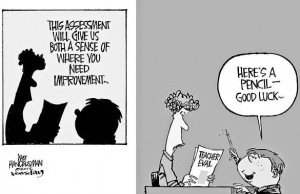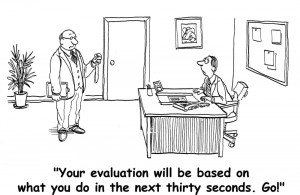Teacher Evaluation that makes sense
 Teacher Evaluation that makes sense
Teacher Evaluation that makes sense
by Jared Gellert
Great teachers make a difference. Lousy teachers also make a difference. The better the teacher body, the better for the kids. These are obvious points. But how to determine who is good and who is lousy and should no longer be a teacher is a serious point of contention between Teachers Unions and Education “Reformers.” Read our post here from the perspective of a Principal.
Share this if you find it useful! Hit the button below.
Ed Reform makes two good points
The “reformers” have two points in their favor that we should not forget, even as we attack their proposed solutions. First, poor teachers should be fired. No system is going to hire only people who are good, and you want the bottom chunk to leave, voluntarily or involuntarily. This, I want to emphasize, is just as true of CEO’s, Wall street billionaires, retail clerks, custodians, nurses and baristas. Every occupation has people who just aren’t suited. Teacher unions have protected teachers who simply shouldn’t be protected. It’s their dirty, not so little, not so secret.
 Second, the fact that teacher pay is based solely on status and not performance discourages a certain group of people from becoming teachers. Since money is a common measure of worth in our society, and is necessary for the purchase of things we want, making the same amount of money as someone next to you who works significantly less than you do and/or doesn’t do the job as well—that’s discouraging. Combine that with pay that is generally OK, but nothing special, and a lot of ambitious people who might otherwise become teachers will go do something else that pays better and where their efforts are financially rewarded.
Second, the fact that teacher pay is based solely on status and not performance discourages a certain group of people from becoming teachers. Since money is a common measure of worth in our society, and is necessary for the purchase of things we want, making the same amount of money as someone next to you who works significantly less than you do and/or doesn’t do the job as well—that’s discouraging. Combine that with pay that is generally OK, but nothing special, and a lot of ambitious people who might otherwise become teachers will go do something else that pays better and where their efforts are financially rewarded.
Money isn’t the only reason that people who might well choose teaching wind up choosing other professions over teaching—working conditions and being treated as a professional are also really important. But money and the compensation’s system lack of differentiation is a real factor.
But how do we evaluate which teachers are really good, which are OK, and which are terrible and should leave? The “reformers”’ answer is test results. The testing attempts to take into account the starting point of students, so a teacher isn’t penalized for teaching needy students. But test results are a terrible and completely unreliable measure.
Let me offer three examples, all drawn from Diane Ravitch’s Reign of Error.
- Houston used an evaluation method based on test results that had a former district teacher of the year fired. There’s no way that someone who was good enough to be the teacher of the year became so terrible that she or he could be fired. Her test results were also highly positive one year and highly negative the next. (http://nepc.colorado.edu/blog/houston-you-have-problem)
- Another teacher from Houston: the teacher said “I teach the same way every year. My first year got me pats on the back. My second year got me kicked in the backside. And for year three, my scores were off the charts. I got a huge bonus. What did I do differently? I have no clue.”
- A third example from here in New York where the Department of Education released the names and ratings of teachers, with a margin of error of 35-53%. In other words, a teacher of reading who scored in the 50th percentile might be either in the 100th percentile or the 0%. So was this teacher average, the best or the worst in the system? From the statistics, there’s no way to know—that’s how large the margin of error is.
 We need ways to know who our best teachers are. We need to find ways to get rid of our worst teachers. But test scores aren’t it. We should be talking about how to address these issues outside of test scores.
We need ways to know who our best teachers are. We need to find ways to get rid of our worst teachers. But test scores aren’t it. We should be talking about how to address these issues outside of test scores.
Jared Gellert is the executive director for CITE. CITE trains teachers, administrators, and counselors in NYC and Long Island (including SUFFOLK). For more info please call 877-922-2483
Please share if you find this interesting! Hit the button below.




